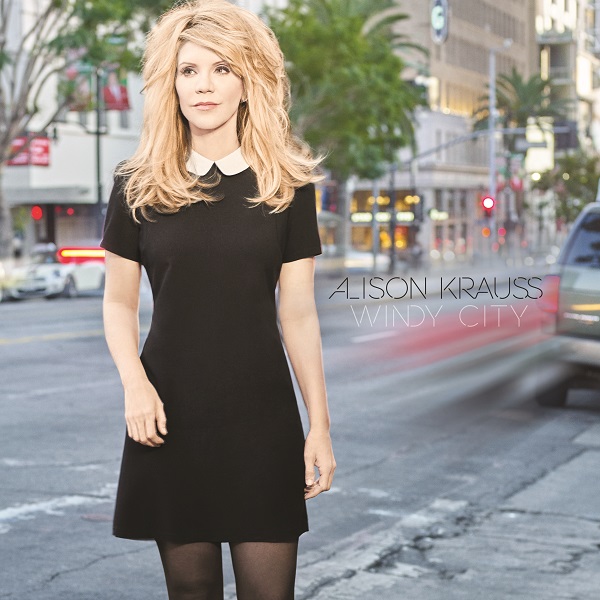Alison Krauss
Windy City
Blue Note
In a world where all artists of a certain age lean into the standards with some form of orchestral backing, it was only a matter of time before pristine bluegrass vocalist Alison Krauss took the plunge. But rather than turn in a moribund vanity collection — like the Three Bears’ beds either too rigid or flabby to work — the 27-time Grammy winner turned to Willie Nelson/Merle Haggard producer Buddy Cannon for the project. What emerges is Windy City, an album closer to the vintage country of Nashville in the ’60s, before Countrypolitan drowned saloon singing like so many kittens in a river of gloppy, Karo-syrup-thick strings. At the same time, Krauss exhumes an elegance to the retro material that somehow sounds current in the same way that kd lang’s Shadowland was delightfully of the moment.
That Krauss would shine here was all but a given; the crystalline vocalist who became a bonafide phenomenon at 14 has sung of deep ache and longing with conviction throughout her entire career. But a light hand and good casting goes a long way on Windy City, too. Certainly Cannon understands getting out of the way through his almost minimalist work with Nelson, and Krauss, who’s partnered with Robert Plant as well as Union Station and recorded with everyone from Hank Williams Jr. to Brad Paisley, understands the importance of the musicians supporting the nuance she brings to these songs. Enlisting many of Nashville’s old guard A-listers — including steel player Mike Johnson, guitarist Richard Bennett, drummer Chad Cromwell, keyboardist John Hobbs and sax vet Jim Horn — she creates authenticity by allowing the players to have their freedom. Union Stationers Barry Bales, Ron Block and Dan Tyminski and the Cox Family’s Sidney and Suzanne Cox are also featured.
Employing a Western-swing-goes-Dixieland romp through “It’s Goodbye and So Long to You,” pious is not the approach taken as the brass blares and the twin fiddles reel and whirl around Johnson’s truculent steel guitar. That steel then offers an elegant dignity to the title track, as Krauss’ conversational plea for the big city to relinquish its hold on her paramour; more falter and concession than Merle Haggard’s “Big City,” there is that wide-open rejection of the adrenal-fanning pleasures that come with the urban crush.
Not that this is a country bumpkin affair. As the left hand builds drama on a concert grand piano, Krauss offers an almost naked picture of the raw state of the world around her before descending into an almost cha-cha take on Nelson’s “I Never Cared for You.” An accordion wheezes in the background, an electric guitar glows as it offers a counter melody on the bridge. Even the classic, straight-up singer-on-the-road balladry of Vern Gosdin’s “Dream of Me,” co-written by Cannon, represents basic midcentury country without flourish. Simple and direct, it reminds you how good country is at its roots; all slow burning emotions, clear desires and the willingness to honor simplicity without over-singing, it’s a perfect contrast that suggests how the genre got so far off its blocks. Even a turn through John Hartford’s once ubiquitous “Gentle on My Mind” sparkles. What Glen Campbell turned into one of the most played songs of all time is reborn with a much smaller scope that speaks volumes: Cut down to size, the lyric’s picture of America and the wanderlust that infects dreamers is given an intimacy that suggests the endurance — and balming nature — of pure love without agenda. “All Alone Am I,” meanwhile, a delicate marvel of silky vibrance, the grace that shimmers in the gentle flutter of Krauss’ slight vibrato rising and falling as the song opens wide.
Beyond the obvious balladry, there’s the Norteno-inflected take on“Poison Love,” a gut-string guitar intertwining with steel, the piano pumping a festive set of chords. For something so sad, there’s an undeniable joy and buoyancy to the track of the Johnnie & Jack chestnut. But in many ways, the highlight is the closing “You Don’t Know Me.” Krauss’ reading of Cindy Walker’s oft-covered classic about repressed romance has the all faltering hesitation of the Ray Charles soul hit, but with just enough regret to understand what’s been lost in the chance not taken. Here, Krauss’ willingness to know her emotional underpinnings allows the song to become even more complex in the interpretation delivered against a spare but well-deployed piano and rhythm section.
What this will all mean to Krauss’ career is hard to say. Is Windy City a declaration that she can handle the sophistication? Another feather in her diversity bonafides? A way to explore the classic song structures beyond her obvious bluegrass origins? Maybe it doesn’t matter. Though it will likely not become Stardust, this is an album of touchstones from another time offered a new life and a new light. — HOLLY GLEASON






No Comment